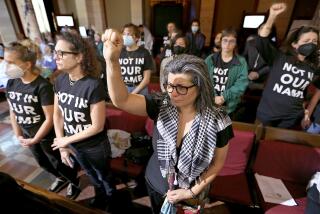SOUTHERN CALIFORNIA AND THE PERSIAN GULF CRISIS : 10 Clerics Urge Bush to Pursue Diplomacy
- Share via
Alarmed by escalating U.S. threats of war in the Persian Gulf, 10 Southern California religious leaders issued an unusual joint statement on Wednesday imploring President Bush not to resort to military action until “intensive diplomatic efforts” are exhausted.
The leaders, in what was believed to be the first such joint appeal by Protestant, Catholic and Jewish clergy, urged Bush to factor into his policy decisions the amount of suffering war would cause in proportion to the good achieved.
“Particularly important is the issue of proportionality,” they declared. “That is, to recognize that a war which caused the death of many thousands of civilians as well as the military personnel of both sides may bring even more suffering than the wrong that is to be corrected.”
The statement was issued as Bush declared in an interview televised Wednesday that “no price is too heavy to pay” to force the withdrawal of Saddam Hussein’s troops from Kuwait, which they invaded on Aug. 2. If war does break out, Bush said, “I would hope it would be over in a few days, but what happens realistically, is hard to tell.”
Although the group began drafting its statement a few weeks ago, it was such talk, they said, that prompted them to speak out Wednesday, the day before the last date that Bush had said was acceptable for a meeting between the two countries.
“War is not something that is simple and brief and over with in a hurry,” declared Los Angeles Roman Catholic Archbishop Roger Mahony. “War will devastate both Kuwait and Iraq. Thousands and thousands of people will be injured and their homes destroyed.”
Episcopal Bishop Frederick Borsch, who said his own son, a lieutenant in the Navy, had recently returned from the Persian Gulf, said he would prefer the use of long-term sanctions over war, even if sanctions took years to work.
“President Bush says we must do this for the future of the new world order,” Borsch said. “My point is what an opportunity to find another way. . . . Even if we do win this war, we (the United States) will come out the loser, the aggressor . . . the bully.”
The leaders said they might differ over the point at which they would find war morally acceptable but agreed that that point had not been reached.
Bishop Jack M. Tuell of the United Methodist Church, asked whether he could envision any point at which he could justify war in the Gulf, replied, “My brief answer is no.” War, he added, is a “barbaric way of resolving disputes among countries.”
Rabbi Lennard R. Thal, director of the Pacific Southwest Council of the Union of American Hebrew Congregations that represents 72 Reform congregations in the region, did not go so far.
“I have no illusions about the cruelty of Saddam Hussein,” said Thal, who drafted the statement. “I am not saying we should avoid war at all costs. But . . . I just want to be as sure as I can be that war is the only way.”
Some Jewish groups have voiced support for President Bush.
The statement condemns the Iraqi invasion of Kuwait and rejects any attempt to condition its withdrawal from Kuwait on the resolution of “any other conflict,” such as the Palestinian issue. Economic sanctions, while “helpful,” the statement said, “must be joined to intensive diplomatic efforts and negotiating strategies.”
Clerics around the country began speaking out against U.S. military force in the gulf shortly after troops were dispatched. Bush’s announcement on Nov. 8 that he would double U.S. troop strength in the gulf galvanized opposition from the two largest bodies in organized U.S. religion--the National Conference of Catholic Bishops and the National Council of Churches.
A handful of ecumenical statements have been issued against the war by impromptu groups whose members include lay people and clerics. One such group, called the Religious Community Against War in the Persian Gulf, is based at Pasadena’s activist All Saints Episcopal Church.
Members of the coalition which issued the statements Wednesday have been meeting regularly for nearly three years to discuss issues of common religious and ethical interest.
Others signing the statement were Bishop J. Roger Anderson of the Evangelical Lutheran Church in America; Revs. Irven and Pattie Stern of the Church of the Brethren; Bishop E. Lynn Brown of the Christian Methodist Episcopal Church; Archbishop Vatche Hovsepian of the Armenian Orthodox Church, and Dr. Teruo Kawata of the United Church of Christ.
More to Read
Get the L.A. Times Politics newsletter
Deeply reported insights into legislation, politics and policy from Sacramento, Washington and beyond. In your inbox twice per week.
You may occasionally receive promotional content from the Los Angeles Times.









